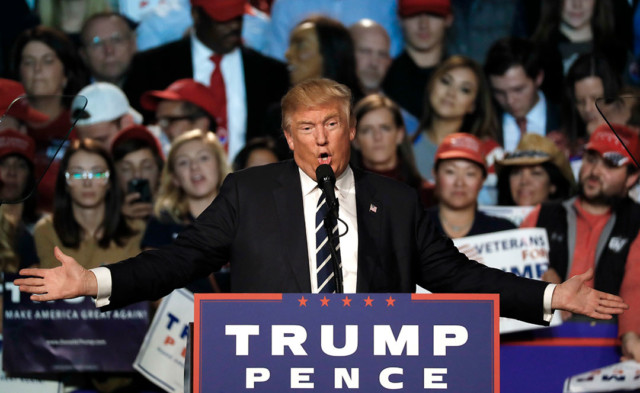Donald Trump’s election victory made front-page headlines across Asia—but, as Asian leaders gather for the APEC meetings, where the next U.S. President’s stands on the future of trade in the region is a blank page waiting to be filled in.
CCTV’s Nathan King reports from Washington.

Under U.S. President Obama, the Trans-Pacific Partnership was the only trade deal on the table for Washington. The pact was negotiated by 12 member economies including Japan, Vietnam, Singapore and Malaysia. Signed earlier this year, the TPP was meant to eliminate 18,000 taxes, in the form of tariffs, opening up growth opportunities for U.S. agriculture and textiles and protect workers’ rights and intellectual property.
China was not involved but expressed a potential for joining later on.
But, that was before the U.S. presidential election campaign, where Trump said TPP would kill millions of U.S. jobs. Trump’s rival, Hillary Clinton, agreed.
“I oppose it now, I’ll oppose it after the election, and I’ll oppose it as President,” Clinton said while she was still campaigning for president.
Trump blames trade agreements for U.S. job losses over the last 20 years – particularly the North American Free Trade Agreement among the U.S., Canada and Mexico and China’s membership in the World Trade Organization. He has promised to bring those jobs back.
“You lost your manufacturing, you lost your jobs. Other than that, you’re doing great, right But we’re going to bring it back, we’re going to bring it back like never before,” Trump said.
However, some economic analysts don’t think Trump can deliver.
“Most of those jobs that left the United States for China are low-wage, low-skilled manufacturing jobs so they were priced out of the American market. Well, now they’re being priced out of the Chinese market which still pays wages far beneath even minimum wage jobs in the United States. So the jobs that China is shedding are jobs that are going to places like Vietnam, Bangladesh, Thailand and Malaysia and even Africa,” said Christopher Balding, Professor of Economics at Peking University HSBC Business School.
Trump has also promised to “put America first” and has threatened to slap tariffs on Chinese imported goods up to 45 percent. But, that was during the campaign- his actual policy has yet to be announced.
Under Trump, the Trans-Pacific Partnership trade deal is likely dead- and some analysts says U.S. credibility on trade issues in Asia has been damaged. What a Trump administration can or will do to try and jumpstart trade and global growth is on the line. There are not many other member economies which can take the lead when it comes to Pacific and global trade, but APEC members are ready to move forward with other ideas.
 CGTN America
CGTN America
 Then-Republican presidential candidate Donald Trump speaks at a campaign rally in Grand Rapids, Mich. Nov. 15, 2016. (AP Photo/Paul Sancya, File)
Then-Republican presidential candidate Donald Trump speaks at a campaign rally in Grand Rapids, Mich. Nov. 15, 2016. (AP Photo/Paul Sancya, File)
